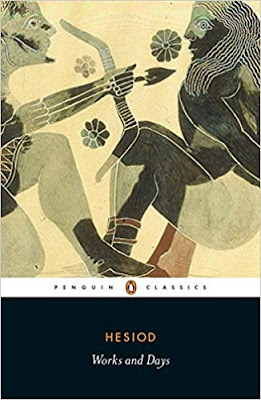Hesiod Works and Days
Translated
by A.E. Stallings
Penguin
Classics
Great
Britain
ISBN:
978-0-141-19752-4
52
Pages
$9.00
Review
by Dennis Daly
Just
the polish from A.E. Stallings new translation of Hesiod’s Works
and Days can blind. Only momentarily, of course. But certainly the
well-wrought formality of each couplet causes the reader a certain
hesitancy and a loss of verbal sense as he or she marvels at the
architectural details and pinpoint verbiage embedded by Stallings in
this brilliant rendition of a fountainhead epic.
Hesiod’s
persona, through Stallings, reaches out from its ensconced eighth
century (BCE) sanctuary with unmistakable antique connections
cocooned within a surprisingly modern ethos. Born in the boondocks of
Grecian Boeotia, Hesiod was a child of emigres. His father had fled
the hardships of a sailor’s life and re-established his family
inland, in the farming village of Askra, under the loom of Mount
Helikon. This farming background frames and informs the structure of
Works and Days. Starvation, according to Hesiod, is only one failed
harvest away and worldly riches needs only a god’s nod and hard
work. In fact Zeus has sent a twin of Strife to prod men on. She
impels human kind with envy and competitive juices. Hesiod explains
the power of this second sisterly Strife this way,
…This
Strife, high-seated Zeus
Set
in earth’s roots—for this one has a use:
She
spurs a man who otherwise would shirk,
Shiftless
and lazy, to put his hands to work
Seeing
a rich man plough and plant and labor
To
set up house—then neighbor envies neighbor
Racing
to reach prosperity. This Strife
Is
boon to man. And that’s why in this life
Potter
hates potter, builder has no regard
For
builder, nor beggar, beggar; bard loathes bard.
“Bard
loathes bard. “ Hmmmm. This may shock. Except, of course in Boston
Massachusetts and its surrounding environs, circa 2019, where groups
of poets and other elites muster ostensibly like militia into armed
camps. I suspect other geographical poetry hot spots offer the same
dynamic. Nor are these contributory ills the only ones inculcated
into human nature. Works and Days significantly contains the first
account of Pandora’s Box (or in this case jar) of mischief and
needling woes. Actually Pandora herself, the gods modeled from clay
making her also a receptacle of many vices and a few virtues. Yet
another gift from the gods.
Considered
the architype of a long line of self-styled poets, still prevalent in
today’s 21st
century prosodic circles, Hesiod neatly provides his name (from the
Theogony) and his Bio (from Works and Days). He speaks of himself in
a way that his contemporary, Homer, could not. Hesiod even advertises
himself as a prize-winning poet and poet laureate. He won a three
legged caldron (a not insignificant prize) at a funeral games
competition on the island of Euboea, apparently his only sea-going
trip. He had earlier received his laurels, a laurel staff--not
wreathe, awarded by the Muses themselves, on the slopes of Mount
Helicon. How, one wonders, did the Muses introduce themselves to this
young sheep herder? Hesiod had pretty obviously needed to establish
his bardic authority and, with these props, he did so—dramatically.
Hesiod
had a younger brother named Perses, who seems to have jilted him out
of part of his inheritance. Much of Works and Days is addressed to
Perses and the magistrates involved in the case. The poetic work
itself is a didactic disquisition on the evils in society and the
importance of an all-encompassing cosmic justice system that promises
(or should promise) fairness to hardworking and decent folk. Although
the poet seems to lament his own trials and tribulations, especially
his brother’s actions, Hesiod mainly focuses on the resolution of
worldly conflict, both within his family and without. His suggestions
of future probity to his wayward brother appear well meant and
sincere. Hesiod addresses his brother reasonably,
So
Perses, mull these matters in your mind,
Give
ear to Justice; leave Force far behind.
For
Kronos’ son gave justice to mankind;
The
fish and beasts and winged birds of the air
Eat
one another—they don’t have a share
Of
law and right—he made the law for man,
And
this way is by far the better plan.
Far-seeing
Zeus will grant prosperity
To
him who speaks up for the truth…
In
the same way that Alexander Pope made Homer’s Iliad his own
masterpiece, Stallings has made Hesiod’s Works and Days her own
signature piece. She retrieves Hesiod from the ancient mists of
Western Civilization, as the oral traditions were dying and as the
written word slowly gained credence and immortalizing legitimacy. She
translates Hesiod’s original unrhymed dactylic hexameters, a mix of
Ionic Greek and Aeolic, into rhymed English iambic pentameter. The
rhyme she adds as an extra hurdle because, as she explains it, “I
can’t fudge through something puzzling if it must also rhyme and
scan. Also, rhymed iambic pentameter couplets can have, in the
twenty-first century, a slightly old-fashioned feel to them… as
Hesiod’s Greek would have had a quaint ring even to classical
authors.” Consider these timeless lines of Hesiod via Stallings
that summarize the gift of especial days with mnemonic persuasion and
elegant delivery,
These
days are gifts to those who dwell on earth—
The
rest, haphazard, with no special worth,
Fateless.
One praises one day, one, another;
Few
know: a day can go from stepmother
To
mother. Blessed and rich is he, who’s wise
In
all these things, who works, and in the eyes
Of
the deathless ones is blameless, one who reads
The
omens of birds, avoiding all misdeeds.
For clarity and
class and prosody that sings through its print, Stalling’s Hesiod
is unrivaled. Endear yourselves to the immortals and read this
compelling translation that introduces with a formalist literary
flourish that fragile Western Civilization which still, to this day,
nurtures the best of artistic creation.



































